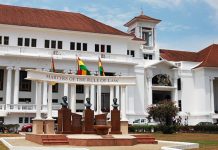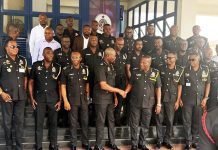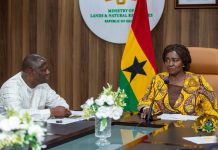They came in their thousands to offer support and be living witnesses to the spectacle unfolding before their own eyes.
Men and women, young and old, from all walks of life joined in the jamboree; drumming, singing and dancing in the sunlight and under the glittering lights at the newly commissioned Legon Sports Stadium, and at all other facilities provided by the Republic of Ghana for the 13th All-Africa Games.
The curtain was lowered on the Pan-African Games in Accra, at the weekend.
In any language, the 13th All-Africa Games was a huge success. The broad smiles and laughter on the faces of Ghanaians at game venues and in front of their television sets around the country, told the story of immense satisfaction. In all probability, the games has wiped out the gloom on many faces across the country. One hope that officialdom will learn from the organisation of the games is that it will provide the fillip to turn the economy round.
Michael Johnson
Many may not know this. But Michael Johnson, the American who made the world record in the 200 meters and 400 meters his personal property for ages, watched the games on television and recommended the atmosphere at the Legon Stadium, especially for European and American audience to learn from. The vociferous support with gyama on display, blew the mind of the international icon.
Team Ghana and 68 medals
Apart from the general happiness that the game generated, the return was impressive. With 68 medals, including 19 gold, the return from the games for Team Ghana was way over national expectation. Since the 2nd All Africa Games in Lagos, from where Ghana returned home with nine gold medals, Ghana has never had it so good at the games. 68 medals with 19 gold is a great achievement.
Sporting facilities legacy
We also have sporting facilities to aid Ghana take on the world in sports competitions. The University of Ghana Stadium is now a finished magnificent edifice, after more than a decade of wrangling, as to which of the two main political parties should accept the blame for the failure to make it function.
Until the 13th All Africa Games, many Ghanaians, including my humble self, did not know of Borteyman as a human settlement. Now, not only is the township very popular with sports fans, it has become the home of Ghana sports.
Ugly Noises
Everything being equal, Borteymen would host this nation’s university dedicated to sports very soon. The residential facilities are ready, and so are first class facilities for indoor games like basketball, volleyball, handball, badminton and a first class Olympic swimming pool. It is unfortunate that the National Democratic Congress (NDC) are making ugly noises, insinuating that the US$169 expenditure is money thrown away. It cost US$169 million to provide facilities and to host the games.
In our economic circumstance, it is easier to make political capital out of every expenditure, especially in an election year, when the opposition gears itself up for any slip to attack.
On this and several other occasions, I think the NDC have goofed. In my humble opinion, Minister of Sports Mustapha Usif and his predecessor, Kwame Asiamah, have served Ghana well.
All-Africa Games idea
It was Asiamah who bought into the All-Africa Games idea and commissioned Dr. Emmanuel Owusu Ansah, one of the main technical people in sports organisation in this country and Mr. Rex Danquah of Rex Image and other sports-inclined personalities, to prepare and bid for the hosting right to the 13th All Africa Games in 2023.
The institution of the games in 1965 took a political directive to get the games on board. But its genesis could be traced to the dismal performance of African athletes in the 1960 Olympic Games in Rome and the 1964 Games in Tokyo.
In Rome, the first African medalist was boxer Ike Quartey, uncle of Ghanaian professional pugilist, with the same name. Our Olympian won silver at the welterweight division before Bikile Abebe of Ethiopia closed the games by claiming the marathon gold, running bare-foot.
Sad Case of Amevor
These performances gave an indication that Africa would do well with the right training and resources. But a drama at the Tokyo Olympics brought it home that it was not only important, but urgent to get a Pan-African Games going to serve as the preparation grounds for the Olympic Games. In those days, Ghana had a long distance runner. His name was E.D. Amevor. He was a dedicated policeman, who served the nation as an athletic icon. Amevor was the 1,500 metres champion in West Africa.
Mr. Ohene Djan, Director of Sports in Ghana and his technical men and women at the then Central Organization of Sports, believed they had a talent to compete with the best the world could offer. On Amevor’s very first contest in Tokyo, the policeman flopped miserably. Apparently, he thought he was in the wrong race when the gun boomed and the athletes rose, running on the track. He told his own story to Ghanaian officials after the event. “I looked my back, I saw that nobody dey. I knew that I Amevor, I am last.”
When the Ghanaian contingent arrived in Accra, the story of the African inequality with European and American performers, especially the sad case of Policeman Amevor, was relayed to Osagyefor Dr. Kwame Nkrumah, the then influential Head of State of Ghana, who went to the podium of the Organization of African Unity in Addis Ababa, and tabled the motion for the urgent organisation of a Pan-African Games, to prepare Africa ahead of the Olympic Games.
The Supreme Council for Sports in Africa was formed with Congolese Claude Ganga, as Secretary-General. Mr. Ganga managed to convince the Government of Congo (Brazaville) to host the First All-Africa Games in Brazaville in 1965.
The games were billed as an event to take place every four years, just before the Olympic Games. Unfortunately, after the first Games in Brazaville, it took eight years for the second games to take place in Lagos, Nigeria.
Huge Success
The Lagos Games were hugely successful, but the huge expenditure outlay put off many contenders before Nairobi (Kenya) managed to find the financial engineering involved, to host Africa in 1987.
The All-Africa Games have come to stay. It is the hope and prayer of some of us that contenders would not be put off by finances involved. After the show in Accra, the continental train moves to Egypt in 2027.
In the case of Ghana, the hosting of the games has bailed us out of a grave situation. We have shied away from hosting all this while, as a result of lack of facilities and the fear to commit huge resources to get it done.
Putting our money where our mouths are
Our quest for sporting facilities began long ago. But we have all this while failed to put our money where our mouths are. Our first major infrastructure for sports development was the Accra Sports Stadium, constructed by the British colonial administration as a by-product of the 1948 disturbances.
The Burns Commission set up to investigate the circumstances leading to the 1948 riots in Ghana, established that lack of recreational avenue was part of the reason why the riots were so severe.
The Commission recommended the construction of a national edifice for sports. The Accra Sports Stadium was constructed and commissioned in 1955. Following the successful opening of the stadium, the colonial government impressed on the United African Company (UAC), now Unilever, to construct the Kumasi Sports Stadium, now Baba Yara Stadium, as a gift to the chiefs and people of Ashanti region for their huge cocoa sales to the company.
With Accra and Kumasi Stadia providing facilities for football, athletics and table tennis, boxing, etc. Ghana became a haven for sports in West Africa. In 1955, Ghana beat Nigeria 7-0 in football.
In athletics, the emergence of Robert Kotei (high jump), Mike Ahey, Bukari Bashiru, B.K. Mends and Okantey, who came to dominate the sprints in West Africa, gave this country a huge boost. In Kumasi Mr. A. O. Lawson nurtured a group of young men and women to continue the domination of athletics by Ghanaians on the West African scene.
In table tennis, the Quaye Brothers, E.A. and Okine (men), Ethel Jacks and Ernestina Akuatey (women) propelled Ghana to dominate the West African scene. Amateur and professional boxing also flourished until the facilities in Ghana became obsolete. Meanwhile, countries like Nigeria, with facilities created for the All-Africa Games in 1973 and 1991, Egypt and South Africa, were dominating Africa.
As a young journalist
Unfortunately, our quest for improved facilities in sports had been fleeting at best. I remember as a young journalist, working for the Ghanaian Times at the time, I had a running battle with authorities in charge of sports, over the construction of a swimming pool for national use at the Accra Sports Stadium, as part of facilities provided for the hosting of the 1978 African Cup of Nations tournament in Accra and Kumasi.
The pool, a very narrow stretch of water, was christened ‘Onasis Bath’ by leading members of the Sports Writers Association of Ghana (SWAG). The pool rather reared frogs without any serious attention, until someone decided that turning the site into a maize farm was better than waiting for infinity, for the pool to be constructed.
After the fiasco of 1978, no attempt was made at providing sporting infrastructure until the advent of Mr. John Agyekum Kufuor, who built two new stadia in addition to the renovation of the Accra and Kumasi Stadia for the hosting of the 2008 African Cup f Nations.
13th African Games
The truth is that, we have not put our money where our mouth is until the staging of the 13th African Games that brought President Akufo-Addo and his Sports Minister on their feet.
What is remarkable is that late last year, when I visited Mr. Kwaku Ofosu Asare at the headquarters of the Local Organising Committee in charge of preparing and hosting of the games, infrastructure was far from complete. That Ghana impressed the world with this fantastic hosting tells the hard work that has gone on behind the scene.
Charles Osei Asibey & Arm-wrestling
The story of Ghana’s participation cannot be told properly without the contribution of Arm-wrestling. Barely a decade ago, Arm-wrestling was a local event engaged in by people seeking fun.
It took one man’s critical thinking to turn it into an international sport in this country.
Mr. Charles Osei Asibey is a broadcast journalist. He used to be the General Manager of Happy FM at Asylum Down, a fashionable suburb of Accra. For what he was doing as a sports presenter, many sporting associations like basketball, volleyball, table tennis etc. tried to court his attention to give them publicity. As time went by, he developed interest in traditional sports and promoted them especially during holidays and traditional events.Those traditional and mainly indoor games include draughts (dame), ludu and incidentally arm-wrestling. He found himself being drawn to arm-wrestling more and decided to delve more into it. He was researching into its origin until one day, he discovered that apparently, arm-wrestling was an international sport with headquarters in Europe. He wrote to the federation headquarters.
One thing led to the other until a local federation was inaugurated under the National Sports Authority in Ghana, in 2017. It is the youngest Sports Federation under the National Sports Authority. Currently, the local federation is led by Mr. Osei Asibey of United Media Consult as President, Dr. Kofi Addo Agyekum of Kofikrom Pharmacy, Vice-President and Mr. Jesse Agyepong of Ghana Free Zone Authority as General Secretary.
Though the federation is a relatively young institution, it has brought many honours to the country. Affiliated to the Ghana Olympic Committee, Africa and World Arm-Wrestling Committees, the Golden Arms, the national team of arm-wrestling in Ghana, have been to all international competitions since inception, winning a staggering medal haul of 336 medals, with 57 percent of it being gold.
Mr. Osei Asibey, President of the local federation is also President of the African body and Vice-President of the World Arm-Wrestling Federation. Wrestling with the arms, has done its part for mother Ghana. With 41 out of 68 medals accrued from the All-Africa Games coming from the sport, arm-wrestling has bailed Ghana out bug time. Chronicle Sport wishes Mr. Osei Asibey and his Golden Arms, the best of everything. VIVA Ghana Sports.
I shall return!










